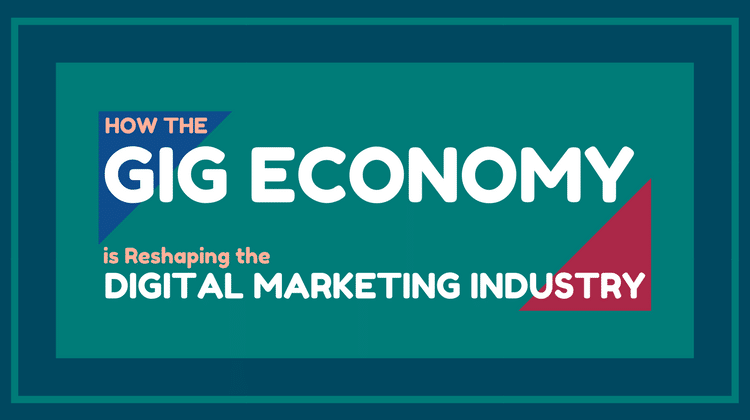
As you use your phone to get an Uber ride or as you prepare to submit your report via email to your client from the opposite side of the globe, you are a part of the growing gig economy.
The gig economy is an economic environment where temporary or short-term positions are very common. These days, independent workers working with short-term projects seem to dominate the current economic status. According to research, by 2020, independent workers in the US will exceed 40% of the total workforce.
With the advent of technology, this is not very surprising. The gig economy is more than just a trend. In fact, it has become a permanent fixture in many organizations.
But what does the gig economy mean for the digital marketing industry? How will it change the current business landscape of the digital marketing industry? Let’s find out what’s in it for us.
The Rise Of Freelancers Impacts the Global Business Landscape
Back in the old days, marketers planned the launch of marketing campaigns. We controlled the industry, and we dictated how consumers would respond. But that was a long time ago. The advent of digital media gave consumers the power to create change.
Consumers, nowadays, control the market. Our role as digital marketers is to respond to and leverage the changes brought by the changing consumer’s behavior.
But with the diverse needs of consumers, there is just too much to do. Consumers are demanding. They expect us to address their needs immediately, and they expect us to offer them something that meets their preferences perfectly. The demand of consumers for real-time engagement across different channels in different locations intensifies every day.
Let’s face it, with all of these requirements and with fast-changing technology, we can no longer keep up the pace. It’s time to utilize the independent workforce from different regions for our global marketing efforts.
The Shift from the Traditional to the Digital Workplace
These days, the definition of the workplace has completely changed. It is no longer just about the physical space occupied by employees in a certain organization. As the number of people who prefer to work remotely increases, the idea of having a digital workplace is no longer just an aspiration. The digital workplace is the new norm in most businesses.
According to a survey by Avanade-commissioned research, about 40% of companies have already adopted digital workplace tools. Business owners, these days, are slowly building a plan to implement a digital workplace in their organizations.
In so many ways, the digital workplace has been beneficial in the digital marketing industry. Unlike the traditional workplace, the supply of digital skills in an organization is no longer limited to the four walls of the physical workplace. Digital agencies can now create a team of independent workers working together virtually and utilizing data and technology for faster collaboration and communication.
The gig economy is bringing innovation to the workplace. In a digital marketing world, embracing the digital workplace that will allow workers to collaborate and develop crucial digital strategies in any way they want can bring a significant marketing advantage.
The Change in Management and Communications
As we are no longer bound by a physical workplace, organizational management and communication clearly have shifted from traditional means to a more advanced technological process.
Disengagement will likely happen in a digital workplace where employers and workers rarely have face-to-face interaction. In digital marketing, a lack of communication and mismanagement can be the downfall of a campaign. That is why employers and managers are now considering viable cloud computing, remote working tools, and for communication and management, enterprise-level technology platforms for independent workers.
Moreover, loyalty is another challenge. Independent workers, as freelancers, can easily cut the connection between employers and communicate with digital marketing clients on their own. This will make competition in digital marketing more challenging. As more and more workers realize that they can work on their own, without an agency, the challenge for digital marketing agencies will be how to maintain good relationships with freelancers and retain them so agencies can benefit from this workforce.
Final Thoughts
It’s safe to say that the rise of freelancers is here to stay. It’s no longer a phenomenon. For digital marketers like us, we are considered the front-line in embracing this change.
It may be difficult for now to forecast the impact of the gig economy to your business, but the new world of recruitment, employment, and management is something we can no longer avoid. As the number of freelancers continues to rise, it’s time for marketers to leverage this growth so we can move forward towards global progress. After all, there is no other way to grow but to adapt and adjust to what the economy has to offer.
About the Author
Key Acanto is an editor of scoopfed.com. She has been an editor of the blog site for almost three years. Occasionally, she also writes content for Bakkah. You can stay connected to her through Linkedin and Twitter (@keyacanto).
.